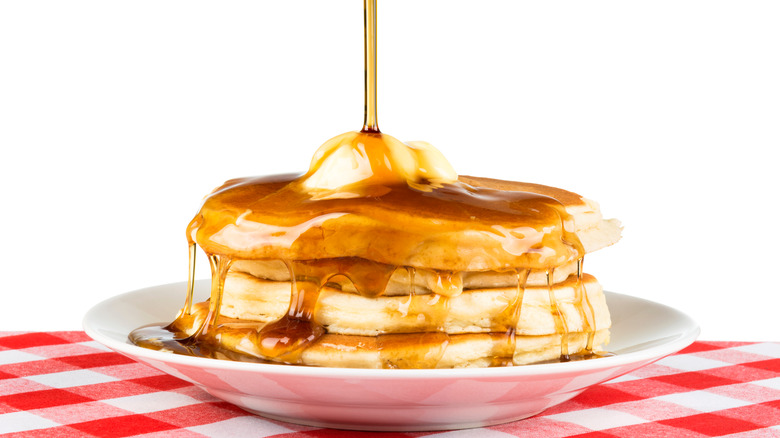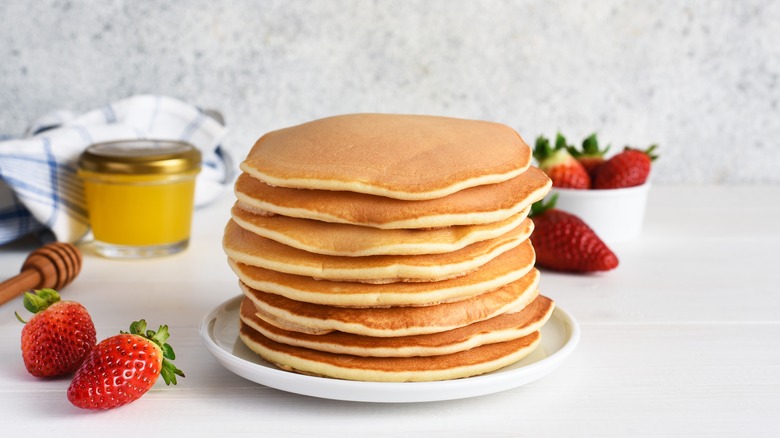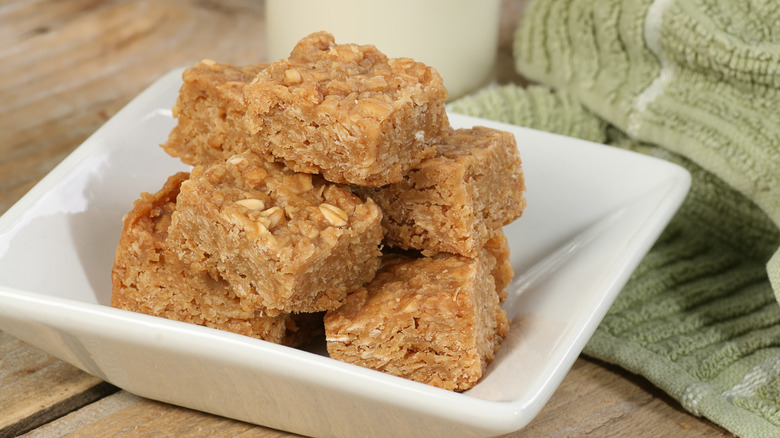Is There A Difference Between Flapjacks And Pancakes?
It doesn't take a genius to see where the name pancake comes from — you're making a batter, just as you would for a cake, but you're cooking it in a pan. It's always nice to find a dish whose name has a clear, sensible origin — unlike "stew," named from bathhouses, or "salad," named from salt (via The Etymology Nerd and Buckhorn Inn). Yet, despite its perfectly descriptive name, the pancake seems to have more nicknames than Babe Ruth. Where do all these monikers come from, and do they mean the same thing?
According to the Collins Dictionary, hotcakes, griddle cakes, batter cakes, flannel cakes, johnny cakes, and hoecakes are all under the entry for "pancake." While closely associated with each other, not all these names are synonymous, and their exact definition may vary depending on where you are. Even the pancake's most famous alter ego, the flapjack, can take on different meanings, depending on which side of the Atlantic you live on.
North American flapjacks are synonymous with pancakes
In the U.S. and Canada, flapjacks are a synonym for pancakes, and you can freely use them interchangeably, per Dictionary.com. While it's not as on-the-nose as "pancake," "flapjack" has more sensible origins than you might think. In the 1500s, the word "flap" could align with "flip" or "toss," something one must do a lot of to make a batch of flapjacks. The "jack" aspect of the name is far less clear, with Dictionary.com suggesting it could derive from the common English nickname for John, but that doesn't tell us what John has to do with breakfast cakes.
In the early days of the American colonies, pancakes were typically made from either buckwheat or corn meal, per National Geographic. At that time, they were usually called hoecakes or johnny cakes (there's that pesky John again). Those names are still in use, but they refer exclusively to cornmeal pancakes, per the National Park Service. Other American terms for the familiar flour pancake include "flannel cake," used in the Mid-North, and "battercake," used in the South (via Collins Dictionary). To add another to the mix, "slapjack" is another term from flapjack.
British flapjacks are similar to granola bars
In the U.K., flapjacks are about as different from pancakes as any food could be. Per Dictionary.com, the British flapjack is a baked good made from oats, and it looks closer to what Americans would call a granola bar than a pancake. MasterClass goes a little more in-depth on the U.K. variant, noting that it chiefly contains rolled oats, butter, and brown sugar, can be had as a quick and convenient breakfast, and can be served with tea.
The British call pancakes, well, pancakes. Masterclass notes that British pancakes are thinner than American ones, more like a crepe. They play a key role in British celebrations of Shrove Tuesday. According to Historic UK, pancakes became a popular Shrove Tuesday meal to use up dairy and eggs before Lent. These days, eating those is okay, but The Sun reveals that Lent used to entail an exclusively vegan diet. Now, Britons celebrate Shrove Tuesday as "Pancake Day," which is customary to have foot races in which everyone runs with a pan, flipping a pancake over and over.


